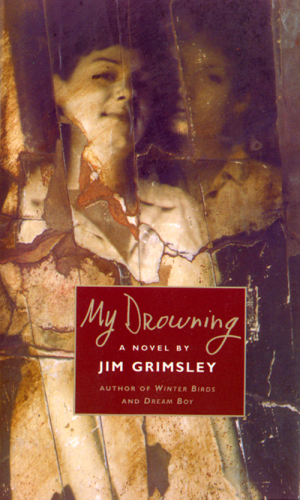
My Drowning
A Novel
کتاب های مرتبط
- اطلاعات
- نقد و بررسی
- دیدگاه کاربران
نقد و بررسی

Starred review from December 30, 1996
The third novel by this PEN/Hemingway Award finalist (Dream Boy; Winter Birds) is an evocative, uncompromising account of a hardscrabble childhood in rural North Carolina that shows Grimsley to be an accomplished stylist and a complex moralist. The narrator is the aged Ellen Tote, refugee from a life of bitter privation. "When I look back... that hard winter in a house not fit for people," Ellen muses, "I amaze myself that my hatred does not burn me crisp." A full stomach nourished by more than fatback and biscuits, steady work, a life unimpeded by the shadows of superstition and poor health, even the homely sight of a full refrigerator--one of "a thousand insignificant details" that come to mean freedom to the adult Ellen Tote--seem cruelly unreachable to the struggling family. The girl is cowed by the sullen and sometimes violent marriage between Mama and her taciturn spouse, who bristles with bitterness. In the carefully honed episodes of the novel, Ellen remembers a father whose fist lashed out at his infant son; her sodden, lecherous Uncle Cope; her older sister Nora, blindly hostile to her; a crippled brother, Joe Robbie, dead before his eighth birthday; and two recurrent dreams, metaphors for the inroads that poverty has made on the family and on the soul. The first dream reflects young Ellen's fear of a monster in the woods, ready to make a child its prey--a nightmarish vision that even Ellen's mother comes to share. The second recurrent dream is of Ellen's mother surrendering her body to "the black water" of the river. A book that begins with a drowning and ends with a funeral certainly maps somber territory, but here, as in his other novels, Grimsley's delicate prose and the defiant resilience of his protagonist make reading his work a richly gratifying experience.

Starred review from November 1, 1996
Grimsley returns to the economically depressed and emotionally brutal rural North Carolina landscape of his earlier Winter Birds (LJ 8/1/94) in this compelling tale of a woman haunted by a half-remembered past. Ever since she was a small child, Ellen Tote has had a recurring, and inexplicable, dream of her mother descending into a river as if to drown herself. Now an old woman, far removed from the hardship of her youth, she finds the dream coming back to her more powerfully than ever, leading her to survey her childhood memories for clues to its source and meaning. This novel is richer and deeper than Winter Birds and is fully steeped in the culture and folklore of the rural South. Readers will find it as harsh, and as haunting, as an old woman's dreams. Highly recommended for all collections.--Lawrence Rungren, Merrimack Valley Lib. Consortium, Andover, Mass.

November 15, 1996
As in "Winter Birds" (1994), the mood of "My Drowning" is gritty, violent, and destitute, and the protagonist's problem is to survive the squalor. She is Ellen Tote, whose reminiscences about growing up in a white tenant-farming family in 1940s North Carolina form the core of the novel. As Ellen notices a detail in her comfortable present home, memories of her appalling, abused childhood bubble up. Her father was an illiterate, foul-mouthed drunk; her mother, a continually pregnant survivor in a living hell. Mama's will to continue, however, collapsed; exactly how, Grimsley withholds until the last pages, but the reader gains intimations from Ellen's recurring gothic dream about her mother's drowning. The truth behind the dream has little overt impact on Ellen's remembered upbringing and exists in her mind as a ghostly mystery (in which two deceased siblings regularly appear), parallel to her real world of chronic hunger, incessant chores, and beatings. Fortunately, the poverty and ignorance aren't unremitting; a more cultured way to live is represented by her aunt and a neighbor, a stark contrast to Ellen's recollected vignettes of her own family. Within its period context and coming-of-age trajectory, Grimsley's story molts its dispiriting tawdriness to end on a more positive note of survival and reconciliation. Behind the plain prose, an intriguing work. ((Reviewed November 15, 1996))(Reprinted with permission of Booklist, copyright 1996, American Library Association.)

























دیدگاه کاربران